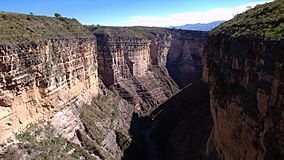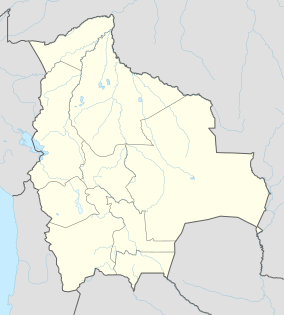Torotoro National Park facts for kids
Quick facts for kids Torotoro National Park |
|
|---|---|
|
IUCN Category II (National Park)
|
|

Torotoro Canyon
|
|
| Area | 165 km2 |
| Established | National Park 1989 |
Torotoro National Park (which means "Torotoro National Park" in Spanish) is a special national park and a small town in the country of Bolivia. The town of Torotoro was started about 250 years ago by the Quechua people and the Spanish. You can find it in the eastern mountains of the South American Andes mountain range, in an area called Potosí.
Contents
Exploring Torotoro's Geography
Torotoro National Park was created in 1989 to protect its unique features. It's located in the northern part of the Potosí region. The park is about 140 kilometers (87 miles) south of the city of Cochabamba.
Size and Landscape of the Park
The park covers a total area of 165 square kilometers (about 64 square miles). It has a semi-arid landscape, which means it's quite dry. The land here ranges from 2,000 to 3,500 meters (6,560 to 11,480 feet) above sea level. You'll find amazing canyons that are up to 300 meters (984 feet) deep!
Unique Rock Formations and Caves
Torotoro is famous for its "karst" terrain. This means it has special features like deep caves and dolines (bowl-shaped holes in the ground). The rocks here are made of limestone from the Paleozoic and Cretaceous periods. These rocks contain fossils and have been shaped over millions of years by wind and water.
Discovering Ancient Dinosaurs
One of the most exciting things about Torotoro National Park is its dinosaurs! Scientists have found pieces of dinosaur bones here. Even more amazing, there are over 2,500 dinosaur footprints preserved in the park's rocks.
Types of Dinosaurs Found
These footprints show us that different kinds of dinosaurs once roamed here. Some were bipeds, meaning they walked on two legs. Others were quadrupeds, walking on four legs. You can see tracks from theropods, which were meat-eating dinosaurs, and sauropods, which were huge plant-eaters. These dinosaur tracks are from the Cretaceous period, about 120 million years ago!
History and Culture of Torotoro
Beyond its natural wonders, Torotoro also has a rich human history.
Remnants of Ancient Cultures
Southeast of the town of Torotoro, there's an archaeological site called Llama Chaki. This site holds clues and remnants of the ancient Quechua culture. It shows that people have lived in this area for a very long time.
Images for kids
See also
 In Spanish: Parque nacional Toro Toro para niños
In Spanish: Parque nacional Toro Toro para niños
 | Dorothy Vaughan |
 | Charles Henry Turner |
 | Hildrus Poindexter |
 | Henry Cecil McBay |




